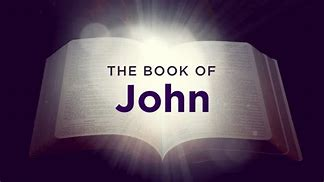Jesus Came to Save the World - {Interlinear <Greek>}
12:44 - And {δὲ<de>} Jesus {Ἰησοῦς<Iēsous>} cried {ἔκραξεν<krazō>} out ← and {καὶ<kai>} said, {εἶπεν·<legō>} “Whoever {ὁ<ho>} believes {πιστεύων<pisteuō>} in {εἰς<eis>} me, {ἐμὲ<egō>} believes {πιστεύει<pisteuō>} not {οὐ<ou>} in {εἰς<eis>} me {ἐμὲ<egō>} but {ἀλλὰ<alla>} in {εἰς<eis>} him who {τὸν<ho>} sent {πέμψαντά <pempō>} me. {με·<egō>}
12:45 - And {καὶ<kai>} whoever {ὁ<ho>} sees {θεωρῶν<theōreō>} me {ἐμὲ<egō>} sees {θεωρεῖ<theōreō>} him who {τὸν<ho>} sent {πέμψαντά<pempō>} me. {με.<egō>}
12:46 - I {ἐγὼ<egō>} have → come {ἐλήλυθα,<erchomai>} into {εἰς<eis>} the {τὸν <ho>} world {κόσμον<kosmos>} as • light, {φῶς<phōs> so that {ἵνα<hina>} whoever {πᾶς ὁ<pas ho>} believes {πιστεύων<pisteuō>} in {εἰς<eis>} me {ἐμὲ <egō>} may → not {μὴ<mē>} remain {μείνῃ.<menō>} in {ἐν<en>} darkness. {τῇ σκοτίᾳ<ho skotia>}
12:47 - • {καὶ<kai>} If {ἐάν<ean>} anyone {τίς<tis>} hears {ἀκούσῃ<akouō>} my {μου <egō>} words {τῶν ῥημάτων<ho rhēma>} and {καὶ<kai>} does → not {μὴ<mē>} keep {φυλάξῃ,<phylassō>} them, • I {ἐγὼ<egō>} do → not {οὐ<ou>} judge {κρίνω <krinō>} him; {αὐτόν·<autos>} for {γὰρ<gar>} I → did → not {οὐ<ou>} come {ἦλθον <erchomai>} to {ἵνα<hina>} judge {κρίνω<krinō>} the {τὸν<ho>} world {κόσμον <kosmos>} but {ἀλλ᾽<alla>} to {ἵνα<hina>} save {σώσω<sōzō>} the {τὸν<ho>} world. {κόσμον.<kosmos>}
12:48 - The one who {ὁ<ho>} rejects {ἀθετῶν<atheteō>} me {ἐμὲ<egō>} and {καὶ <kai>} does → not {μὴ<mē>} receive {λαμβάνων<lambanō>} my {μου<egō>} words {τὰ ῥήματά <ho rhēma>} has {ἔχει<echō>} a → judge; {τὸν κρίνοντα<ho krinō>} • {αὐτόν·<autos>} the {ὁ<ho>} word {λόγος<logos>} that {ὃν<hos>} I → have → spoken {ἐλάλησα,<laleō>} • {ἐκεῖνος<ekeinos>} will → judge {κρινεῖ<krinō>} him {αὐτὸν<autos>} on {ἐν<en>} the {τῇ<ho>} last {ἐσχάτῃ<eschatos>} day. {ἡμέρᾳ.<hēmera>}
12:49 - For {ὅτι<hoti>} I {ἐγὼ<egō>} have → not {οὐκ<ou>} spoken {ἐλάλησα,<laleō>} on → my {ἐμαυτοῦ<emautou>} own ← authority, {ἐξ<ek>} but {ἀλλ᾽<alla>} the {ὁ<ho>} Father {πατήρ,<patēr>} who • sent {πέμψας<pempō>} me {με<egō>} has → himself {αὐτός<autos>} given {δέδωκεν<didōmi>} me {μοι<egō>} a → commandment— {ἐντολὴν<entolē>} what {τί<tis>} to → say {εἴπω<legō>} and {καὶ<kai>} what {τί<tis>} to → speak. {λαλήσω.<laleō>}
12:50 - And {καὶ<kai>} I → know {οἶδα<oida>} that {ὅτι<hoti>} his {αὐτοῦ<autos>} commandment {ἡ ἐντολὴ<ho entolē>} is {ἐστιν.<eimi>} eternal {αἰώνιός<aiōnios>} life. {ζωὴ<zōē>} What {ἃ<hos>} I {ἐγὼ<egō>} say, {λαλῶ,<laleō>} therefore, {οὖν <oun>} I → say {λαλῶ.<laleō>} as {καθὼς<kathōs>} the {ὁ<ho>} Father {πατήρ,<patēr>} has → told {εἴρηκέν<legō>} me.” {μοι<egō>} • {οὕτως<houtōs>}

To Deliver from Darkness. John related at the end of verse 36 that Jesus had hidden himself, but apparently Jesus surfaced briefly to make one final statement (vv. 44–50). As he did in 5:19–30, Jesus asserts his unity with the Father: to believe Jesus is not merely to believe him but is to believe the Father as well, for, as Jesus explained in 5:19–30, he does only what the Father has commissioned him to do.
In 12:45 Jesus articulates a truth he will restate to Philip (14:9), asserting that the one who sees him sees the Father. Those who see Jesus need no imagination or speculation of what it would be to see the unseeable God. Here again the statements Jesus makes about himself provide the foundation for things John said about Jesus in the prologue to his Gospel (1:1–2, 18), and here too is the foundation for Paul’s description of Jesus as “the image of the invisible God” (Col. 1:15) and the author of Hebrews’s statement that Jesus is “the exact imprint of [God’s] nature” (Heb. 1:3).
A shroud of darkness fell over humanity and all creation when Adam sinned and Satan usurped dominion. Jesus came as light to pierce the darkness, with the result that all who believe in him are freed from having to remain in darkness (John 12:46; cf. 1:4–5, 9; 3:19–21; 8:12).
Jesus had stated the purpose of his incarnation in 3:17: “God did not send his Son into the world to condemn the world, but in order that the world might be saved through him,” and he reasserts that reality in 12:47. It was his purpose to come not as judge but as Savior. Those who hear his words but do not keep them (v. 47) will have his word as their judge “on the last day” (v. 48). Jesus has asserted that he will execute judgment at the resurrection (5:27–29), and those who reject him will have his word judge them at the resurrection on the last day (12:48). As in chapter 5, in 12:49 Jesus declares that his message comes from the Father. The Father sent Jesus to speak words of spirit and life (6:63), so when the Father commanded Jesus to speak (12:49), the commandment was eternal life (v. 50). He speaks as instructed by the Father.
References:
All contents are reposted from ESV.org.
“Scripture quotations are from The ESV® Bible (The Holy Bible, English Standard Version®), copyright © 2001 by Crossway, a publishing ministry of Good News Publishers. Used by permission.
All rights reserved.”
Comments